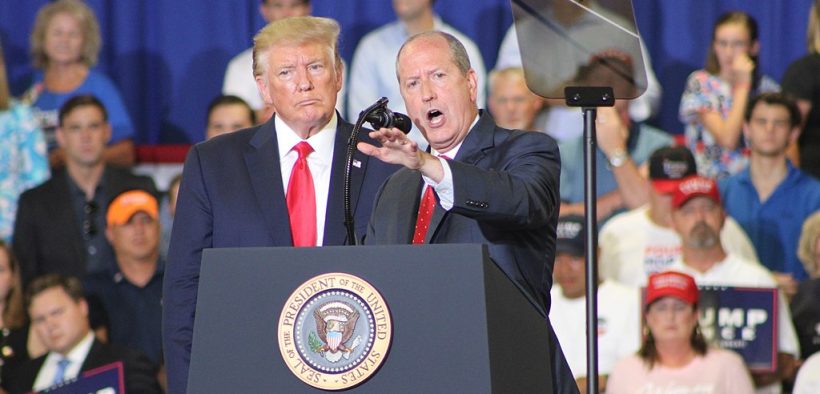Republican Wins North Carolina’s Special Election – What it Could Mean for 2020

Was the Republican win in North Carolina a positive sign for Trump’s 2020 hopes, or was the slim margin of victory a sign Trump is losing support in a historically Republican area?
Republican Dan Bishop defeated Democrat Dan McCready in a special election for an open House seat in North Carolina Tuesday night, in a contest many analysts believe has national implications for the 2020 elections. President Trump threw his weight behind Bishop, traveling to Fayetteville, NC, on Tuesday for an election-eve rally.
“Dan Bishop was down 17 points 3 weeks ago. He then asked me for help, we changed his strategy together, and he ran a great race,” Trump tweeted on Tuesday. “Big Rally last night. Now it looks like he is going to win. @CNN & @MSNBC are moving their big studio equipment and talent out. Stay tuned!”
While some analysts doubt Trump’s significance in securing the district, which has been held by Republicans since 1963, Bishop believes the president helped him deliver the victory. Trump views North Carolina as a “top-tier priority” in the 2020 election, and the Republican National Convention will take place in Charlotte next August.
“[Trump] was a tremendous help,” Bishop told Fox & Friends on Wednesday. “We really only were competitive in terms of funding for about six weeks. So the president and the vice president stepping in and committing the way they did to this race was tremendous. And a lot of credit goes to the president.”
Bishop is a state senator best known for sponsoring the controversial North Carolina law that mandated which public bathrooms could be used by transgender people. The law was repealed in response to boycotts and public outcry which cost the state $3.7 billion, according to the Associated Press.
McCready is a moderate Democrat, Harvard graduate, and Marine veteran who started a business involved with financing solar energy. Bishop’s campaign sought to link McCready’s renewable energy business to Alexandria Ocasio-Cortez’ Green New Deal, and tried to tie him to the leftist positions of “the Squad.”
How the Vote Could Impact 2020
Many analysts believe the special election served as a referendum on Trump, who Bishop bound himself to with a platform based on building the Wall and highlighting the president’s tax cuts.
McCready did well in suburban areas while Bishop won over rural areas, proving that Trump’s base is holding strong despite the president’s job approval rating dipping to 43.1 percent in Wednesday’s RealClearPolitics average, around two points down from mid-July. Bishop told Fox & Friends that he adjusted his strategy to account for parts of North Carolina recently shifting blue.
“Charlotte, where I live, is becoming bluer but we knew we had an unconventional strategy, frankly,” said Bishop. “We knew that the eastern part of this district… [was] important and the president — that’s where he went… and it made a big difference.”
Some analysts interpreted Bishop’s success as a positive omen for Trump’s reelection chances, while others believe the slight margin of victory he wedged over McCready indicates that Democrats are gaining influence in the swing state. Bishop’s margin of slightly more than 2 percentage points was significantly less than the 11 percentage points by which Trump won in the district in 2016.
2018 Election North Carolina Ballot Fraud
In his concession speech, McCready mentioned the ballot fraud investigation that first led to the special election.
“When the people in power sought to silence the voices of the voters, stole their ballots, forged signatures from them, filled in vote choices for them,” McCready said, “We fought back and we won.”
The 2018 midterm election was deemed invalid after the district’s former GOP candidate Mark Harris dropped his bid amid investigations for ballot-tampering. Harris’ operative Leslie McCrae Dowless, who went to prison for fraud in the 1990s and has been criticized for political tampering in the past, is believed to have tampered with absentee ballots in last year’s midterm election:
“According to testimony and other findings detailed at the hearing, Dowless conducted an illegal “ballot harvesting” operation: He and his assistants gathered up absentee ballots from voters by offering to put them in the mail,” wrote the Associated Press. “Dowless’ workers in rural Bladen County testified that they were directed to collect blank or incomplete ballots, forge signatures on them and even fill in votes for local candidates.”















